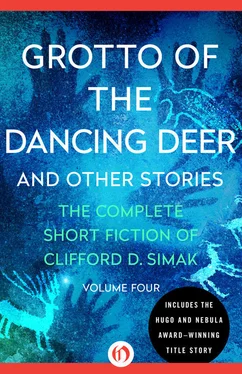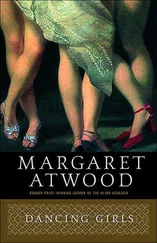“You have a place of your own to watch.”
They shook hands once again and Hennessey climbed into the cab.
“You better make it fast the first mile or so,” said Max. “Our Punks may be laying for you. They might have recognized you.”
“With the bumpers and the power I have,” said Hennessey, “I can get through anything.”
“And watch out for the cops. They’d raise hell if they knew we were helping back and forth.”
“I’ll keep an eye for them.”
Max opened the gates and the truck backed out, straightened in the road and swiftly shot ahead.
Max listened until it was out of hearing, then checked to see that the gates were locked.
Back in the basement he threw the switch that fed current into the auxiliary fence—and now into the mesh as well.
He sighed with some contentment and climbed the stairs out to the yard.
A sudden flash of light lit up the grounds. He spun swiftly around, then cursed softly at himself. It was only a bird hitting the fence in flight. It happened all the time. He was getting jittery and there was no need of it. Everything was under control—reasonably so.
He climbed a piece of sloping ground and stood behind the oak. Staring into the darkness, it seemed to him that he could see shadowy forms out beyond the fence.
They were gathering out there and they would come swarming in as soon as the tree went down, smashing the fences. Undoubtedly they planned to use the tree as a bridge over the surging current that still would flow in the smashed-down fence.
Maybe it was taking too much of a chance, he thought. Maybe he should have used the guy-wires on the tree. That way there would have been no chance at all. But, likewise, there would have been no opportunity.
They might get through, he thought, but he’d almost bet against it.
He stood there, listening to the angry rustling of a hundred rattlesnakes, touchy and confused, in the area beyond the mesh.
The sound was a most satisfying thing.
He moved away, to be out of the line of blast when the bomb exploded, and waited for the day of truce to end.
Unsilent Spring
Clifford D. Simak and Richard S. Simak
Originally published in 1976 in the anthology Stellar Science Fiction Stories 2, which was edited by Judy-Lynn del Rey, this is one of only two published stories in which Clifford Simak worked with a coauthor. This time, his coauthor was his son, a chemist who at one time worked for the U.S. government. The title of the story is, of course, a reference to Silent Spring , Rachel Carson’s well-known book that controversially warned about environmental pollution and disinformation campaigns allegedly spread by certain industries, and ultimately led to the banning of the pesticide known as DDT (although Carson never actually called for that action), and the creation of the U.S. Environmental Protection Agency.
—dww
1
Robert Abbott was a well-known man, so Dr. Arthur Benton had saved two hours for him in the middle of an afternoon of an ordinarily busy day. When Abbott had phoned ten days before, he had insisted that his visit was important.
Benton, watching the clock as the hour approached and trying to hurry Abby Clawson, who regarded a visit to a doctor’s office as a social occasion, wondered once again what could be so important as to bring Abbott to this little Pennsylvania town. Abbott was a medical writer with two best sellers to his credit, one a book on cancer and the other an expose of faddy dieting. The doctors he consulted were important people, eminent medical researchers or lofty specialists; and Benton knew, with a twinge of honest envy, he was neither eminent nor lofty. He was just an old fuddy-duddy country doctor—a pusher of pills, a dispenser of liniments and salves, a setter of broken legs and arms, a wrapper-on of bandages, a deliverer of babies—who never had written a learned paper, conducted a research program, or been involved in medical studies, and who never would. He had not, in more than thirty years, done a single thing or uttered a single word that could be of the slightest interest to a man like Robert Abbott.
He had been wondering ever since the phone call why in the world Abbott should want to talk with him; and over the past few days he had evolved an elaborate theory that there were two Dr. Arthur Bentons and Abbott had confused him with the other Benton. He had been so haunted by the idea that he had looked through a medical directory in search of the other Arthur Benton. Although he had not found him, the idea still clung to his mind, for it seemed the only explanation.
He found himself glad that the hour of Abbott’s visit had arrived, for once he knew what it was all about—if indeed Abbott really wanted him —he could quit his worrying and get down to business. The worry and the wonderment, he knew, had interfered with business—like that matter of Ted Brown’s symptoms that had shouted diabetes but had turned out finally not to be diabetes. That had been damned embarrassing, even though Ted, an old and valued friend, had been nice about it. Nice, perhaps, because he was so relieved he was not diabetic.
That was the trouble, he told himself, sitting behind his desk and listening with only half an ear to Abby’s departing chatter: all his patients were old and valued friends. He could no longer be objective; he bled for all of them. They came in, sick to death, and looked at him with trusting eyes because they knew in their secret hearts that good old Doc could help them. And when he couldn’t help them, when there was no one on God’s green earth who could help them, they died, forgiving him with the trust still in their eyes. That was the hell of family practice, that was the torture of being a country doctor in a little town—holding the trust of people who had no reason to trust you.
“I’ll be coming in again,” Abby said. “I been coming here for years and you always help me. I tell all my friends that I am lucky in my doctor.”
“That’s kind of you to say.”
If they were all like Abby, it wouldn’t be so bad. For with her, there was nothing wrong at all. She was a tough old woman who would outlive them all. The only thing wrong with her was a tendency to secrete an enormous amount of ear wax which required occasional irrigation. But the evident fact of sound, good health did not in the least deter the imaginary ills which brought her regularly to the office.
Rising to open the door for her, Benton wondered what she got from her regular visits, and thought he knew: fuel for conversation with her friends at the bridge table or with her neighbors across the backyard fence.
“Now you take care of yourself,” he told her, putting into his voice a medical concern for which there was no need.
“I always do,” she chirped in her bird-like old woman’s voice. “If there’s anything wrong, I’ll come straight to you.”
“Doctor,” said Nurse Amy, hastening to guide Abby out, “Mr. Abbott has been waiting for you.”
“Please send him in,” said Benton.
Abbott was younger than Benton had expected him to be and not half as handsome. He was, in fact, a rather ugly-looking man—which explained, Benton thought, why the dust jackets of his books had not flaunted his photograph.
“I’ve looked forward to meeting you,” Benton said, “and I don’t mind telling you I’ve done some wondering at what brought you here. Surely there are other men.”
“Very few,” said Abbott, “like Dr. Arthur Benton. Surely you are aware that you are one of a dying breed. Not many medical men today are willing to devote their lives to a small community such as this.”
“I’ve not regretted it,” Benton replied. “The folks are good to me.”
Читать дальше












